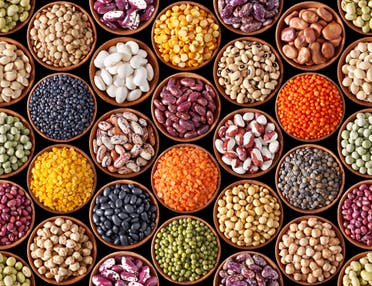To live up to 100 years.. eat these magical foods

The idea of living longer is an important issue for many people around the world, so we see many looking for the best means to achieve this by playing sports and eating healthy and useful food, and among those “magic” foods are legumes known for their richness in minerals and vitamins.
Legumes, which include beans, peas, lentils and chickpeas, are considered a nutritious and filling food. But how can the legume family help us live longer?
All members of the legume family are packed with nutrients, including copper, iron, magnesium, potassium, folic acid, zinc, lysine, an essential amino acid, and plenty of protein and fiber.
Author and entrepreneur Dan Buettner, who has spent decades reporting on “blue zones,” unique communities around the world where people live long, healthy lives, up to 100 years old, outlined the benefits of legumes, according to a CNN report. .
“Fiber rewards you with healthy gut bacteria, reduced inflammation, and better immune function,” Bittner said, noting that “only 5% to 10% of Americans get the fiber they need.”
He also added that each type of bean has different nutritional properties, so it may be best to eat a variety of beans.
red beans
For example, Aduki, or red beans, contain more fiber than many other varieties, while beans are packed with the antioxidant lutein.
Black and dark red beans are full of potassium, and chickpeas contain plenty of magnesium.
“Beans are full of vegetable protein, which is healthier because it contains more nutrients and fewer calories than animal protein,” he added.
Red beans (Shutterstock)
And he pointed out that by pairing the beans with whole grains, you will get all the amino acids that make up a complete protein in terms of nutrition, similar to what is found in meat.
In parallel, Bitner said, studies point to the health benefits of beans, backing up what people in the Blue Zones have long known.
Reduce cholesterol and prevent diabetes
And the soluble fiber in beans can reduce cholesterol and help prevent type 2 diabetes by stabilizing blood sugar.
Whereas, a 2001 study found that eating beans four times a week reduced heart disease by 22%. And a 2004 study found that people lived nearly eight years longer for eating 20 grams of legumes, about one ounce.

In addition, beans help with weight loss, as a 2016 review of studies found that people who ate up to 9 ounces of beans per day over the course of six weeks lost three-quarters of a pound more than people who did not eat beans.
In addition to all these benefits, beans and their cousins are also cheap and can be grown indoors in a variety of soils, making them the perfect food to help economically disadvantaged populations live longer.
xnxx,
xvideos,
porn,
porn,
xnxx,
Phim sex,
mp3 download,
sex 4K,
Straka Pga,
gay teen porn,
Hentai haven,
free Hentai,
xnxx,
xvideos,
porn,
porn,
xnxx,
Phim sex,
mp3 download,
sex 4K,
Straka Pga,
gay teen porn,
Hentai haven,
free Hentai,




